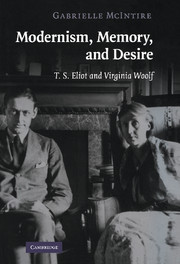Book contents
- Frontmatter
- Contents
- Illustration
- Acknowledgments
- Introduction
- 1 An unexpected beginning: sex, race, and history in T. S. Eliot's Columbo and Bolo poems
- 2 Mixing memory and desire: rereading Eliot and the body of history
- 3 Eliot, eros, and desire: “Oh, do not ask, ‘What is it?’”
- 4 T. S. Eliot: writing time and blasting memory
- 5 Virginia Woolf, (auto)biography, and the eros of memory: reading Orlando
- 6 Other kinds of autobiographies: sketching the past, forgetting Freud, and reaching the lighthouse
- 7 Remembering what has “almost already been forgotten”: where memory touches history
- Epilogue
- Notes
- Index
Epilogue
Published online by Cambridge University Press: 22 September 2009
- Frontmatter
- Contents
- Illustration
- Acknowledgments
- Introduction
- 1 An unexpected beginning: sex, race, and history in T. S. Eliot's Columbo and Bolo poems
- 2 Mixing memory and desire: rereading Eliot and the body of history
- 3 Eliot, eros, and desire: “Oh, do not ask, ‘What is it?’”
- 4 T. S. Eliot: writing time and blasting memory
- 5 Virginia Woolf, (auto)biography, and the eros of memory: reading Orlando
- 6 Other kinds of autobiographies: sketching the past, forgetting Freud, and reaching the lighthouse
- 7 Remembering what has “almost already been forgotten”: where memory touches history
- Epilogue
- Notes
- Index
Summary
Here is the past and all its inhabitants miraculously sealed as in a magic tank; all we have to do is to look and to listen and to listen and to look and soon the little figures – for they are rather under life size – will begin to move and speak, and as they move we shall arrange them in all sorts of patterns of which they were ignorant, for they thought when they were alive that they could go where they liked.
Virginia Woolf, “I am Christina Rossetti”I have been diagnosing the ways in which two exemplary modernist writers thought about time, memory, and desire in their fictional, poetic, and autobiographical writings, making the case that in writing the present of the avant-garde both Woolf and Eliot obsessively turned to history and memory, and when they did so they found themselves called upon to articulate a poetics of desire. Differing from a number of critics who have emphasized a sense of disconnection, discontinuity, breach, and rupture in modernist postures toward the past, I have been arguing that modernism's looking to the past denotes both a return and a departure. Intrinsic to the modernist project was a new, widely shared awareness that their relation to the past could only ever be belated, self-conscious, and palimpsestic – a building on and among ruins whose vitality remains.
- Type
- Chapter
- Information
- Modernism, Memory, and DesireT. S. Eliot and Virginia Woolf, pp. 209 - 213Publisher: Cambridge University PressPrint publication year: 2008



